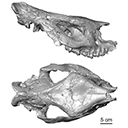Explodable 3D Dog Skull for Veterinary Education
3D models of a Sheep and Goat Skull and Inner ear
3D models of Miocene vertebrates from Tavers
3D GM dataset of bird skeletal variation
Skeletal embryonic development in the catshark
Bony connexions of the petrosal bone of extant hippos
bony labyrinth (11) , inner ear (10) , Eocene (8) , South America (8) , Paleobiogeography (7) , skull (7) , phylogeny (6)
Lionel Hautier (23) , Maëva Judith Orliac (21) , Laurent Marivaux (16) , Rodolphe Tabuce (14) , Bastien Mennecart (13) , Pierre-Olivier Antoine (12) , Renaud Lebrun (11)
MorphoMuseuM Volume 05, issue 02
<< prev. article next article >>

|
Original article3D surface scan of the type specimen of Molassitherium delemontense Becker and Antoine, 2013: use of a 3D model for research and conservation issuesOlivier Maridet
Published online: 19/02/2019 |

|
M3#384Skull of Molassitherium delemontense Becker and Antoine, 2013 (in Becker et al. 2013): holotype Type: "3D_surfaces"doi: 10.18563/m3.sf.384 state:published |
Download 3D surface file |
Barlage, M., Lobbe, R. 2006. Konservierung sulfidisierter Fossilien- zwei Methoden im Vergleich. Der Präparator, 52, 84–89.
Becker, D. 2009. Earliest record of rhinocerotoids (Mammalia: Perissodactyla) from Switzerland: Systematics and biostratigraphy. Swiss Journal of Geosciences, 102, 375–390. https://doi.org/10.1007/s00015-009-1330-4
Becker, D., Antoine, P.-O., Maridet, O. 2013. A new genus of Rhinocerotidae (Mammalia, Perissodactyla) from the Oligocene of Europe. Journal of Systematic Palaeontology, 11, 947–972. https://doi.org/10.1080/14772019.2012.699007
Berducou, M.C. (Coord.). 1990. La conservation en archéologie, Méthodes pratiques de la conservation-restauration des vestiges archéologiques. Elsevier Masson, 469p.
Bromelle, N.S., Pye, E.M., Smith, P., Thomson, G. (Eds). 1984. Adhesives and Consolidants. Preprints Paris Congress, IIC, London.
Cornish, L., Doyle, A. 1984. Use of ethanolamine thioglycollate in the conservation of pyritized fossils. Palaeontology, 27(2), 421–424.
Davidson, A., Brown, G. W. 2012. Paraloid B72 Practical tips for the vertebrate fossil preparatory. Society for the Preservation of Natural History, Collection Forum, 26, 99–119.
Down, J.L., MacDonald, M.A., Tétreault, J., Williams, R.S. 1996. Adhesive testing at the Canadian Conservation Institute - an evaluation of selected polyvinyl acetate) and acrylic adhesives. Studies in Conservation, 41, 19–44. https://doi.org/10.1179/sic.1996.41.1.19
Doyle, A. 2003. A large scale “microclimate” enclosure for pyritic specimens. The Geological Curator, 7(9), 329-335. https://doi.org/10.55468/GC472
Green, O.R. 2001. A Manual of Practical Laboratory and Field Techniques in Palaeobiology. Dordrecht, Springer Netherlands, 538 p. https://doi.org/10.1007/978-94-017-0581-3
Horiec V. 2010. Materials for Conservation. Organic consolidants, adhesives and coating. Ed. Butterworth Heinemann, London, 489 pp.
Keenes, S. 1987. Some adhesives and consolidants used in conservation. The Geological Curator, 1, 421–425. https://doi.org/10.55468/GC8
López-Polín, L. 2012. Possible interferences of some conservation treatments with subsequent studies on fossil bones: a conservator's overview. Quaternary International, 275, 120–127. https://doi.org/10.1016/j.quaint.2011.07.039
Newman, A. 1998. Pyrite oxidation and museum collections: a review of theory and conservation treatments. The geological curator, 6(10), 363–371. https://doi.org/10.55468/GC479
Odin, G.P., Chabard, D., Rouchon V. 2013. Étude de collections de paléontologie - De la caractérisation à la reproduction des altérations de fossiles dits pyriteux. CeROArt, HS 2013, 1–16. https://doi.org/10.4000/ceroart.3409
Phenix, A. 1992a. Solvents for Paraloid B–72. Conservation News, 48, 21–23.
Phenix, A. 1992b. Solvents for Paraloid B–72. Conservation News, 49, 23–25.
Phenix, A. 1993. Solvents for Paraloid B–72. Conservation News, 50, 39–40.
Picot, L., Becker, D., Cavin, L., Pirkenseer, C., Lapaire, F., Rauber, G., Hochuli, P. A., Spezzaferri, S., Berger, J.-P. 2008. Sédimentologie et paléontologie des paléoenvironnements côtiers rupéliens de la Molasse marine rhénane dans le Jura suisse. Swiss Journal of Geosciences, 101, 483–513. https://doi.org/10.1007/s00015-008-1275-z
Pirkenseer, C., Rauber, G., Roussé, S. 2018. A revised Palaeogene lithostratigraphic framework for the northern Swiss Jura and the southern Upper Rhine Graben and its relationship to the North Alpine Foreland Basin. Rivista Italiana di Paleontologia e Stratigrafia (Research in Paleontology and Stratigraphy), 124, 163-246. https://doi.org/10.13130/2039-4942/9867
Podany J., Garland K.M., Freeman W.R., Rogers J. 2001. Paraloid B72 as a structural adhesive and as a barrier within structural adhesive bonds evaluations of strength and reversibility. Journal of the American Institute for Conservation, 40, 15–33. https://doi.org/10.2307/3180010
Rouchon, V. 2012. Altération des collections de paléontologie : compréhension des mécanismes, diagnostic, et optimisation des conditions de conservation des fossiles. Coré, 27, 33–35.
Shelton, S.Y., Chaney, D.S. 1994. An evaluation of adhesives and consolidants recommended for fossil vertebrates. In: P. Leiggi, P. May, (eds), Vertebrate palaeontological techniques, vol. I. Cambridge University Press, pp. 35–46.
Tsetsekou E., Platanianaki A., Pournou A. 2018. Assessing wood adhesives used in conservation by testing their bond strength and ageing behavior. Procedia Structural Integrity, 10, 227–234. https://doi.org/10.1016/j.prostr.2018.09.032
Weick-Neher, M. 2012. Nachtrag zur Pyritbehandlungsanlage in Basel. Der Präparator, 58, 68–71.
Wolberg, D.L. 1989. Stabilizing Pyritic Material. The Paleontological Society, Special Publication, 4, 244–248. https://doi.org/10.1017/S2475262200005207
Jérémy Tissier, Pierre-Olivier Antoine and Damien Becker (2020). 3D models related to the publication: New material of Epiaceratherium and a new species of Mesaceratherium clear up the phylogeny of the early Rhinocerotidae (Perissodactyla). MorphoMuseuM. https://doi.org/10.18563/journal.m3.116
Jérémy Tissier, Pierre-Olivier Antoine and Damien Becker (2020). New material ofEpiaceratheriumand a new species ofMesaceratheriumclear up the phylogeny of early Rhinocerotidae (Perissodactyla). Royal Society Open Science. https://doi.org/10.1098/rsos.200633